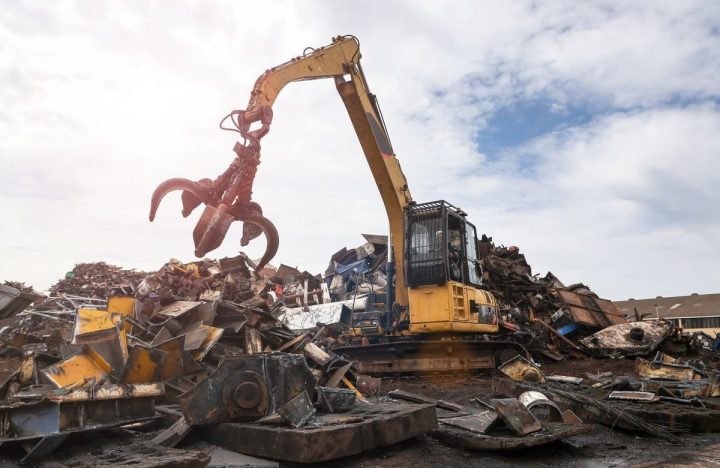ISS TODAY OP-ED
Thriving market for scrap metal smuggling requires greater mettle in protecting East Africa infrastructure

Despite Kenya’s export ban, members of the scrap metal industry are colluding to spur the illicit trade.
On 11 January 2022, Nairobi was plunged into darkness after Kenya Power lost supply along the Kiambere-Embakasi high voltage transmission power line. Vandals in search of scrap metal had removed cross beams on the angle towers, causing the towers to collapse.
That same month, Kenya’s president at the time, Uhuru Kenyatta, imposed a national ban on the local trade and export of scrap metals and scrap batteries. The ban sought to safeguard essential infrastructure from vandalism and protect East Africa’s lead-acid battery manufacturers, who source their raw materials from scrap batteries.
Scrap metals are used to produce steel products in the housing and road construction industries, and batteries are recycled to manufacture new lead-acid batteries.
In May 2022, the trade minister lifted the ban on the local trade, while maintaining the prohibition on scrap metal exports. The ban was lifted after regulations were developed that stipulated higher penalties for those found guilty of repeated scrap metal export offences. The 2022 Scrap Metal Rules added that second-time offenders should be fined approximately $132-000 and serve five years in jail or both.
However, it seems these new regulations are doing little to reduce the vandalism of public infrastructure or the theft that feeds scrap metal smuggling from Kenya to the rest of East Africa. In May 2023, the Kenya Revenue Authority intercepted five trucks transporting stolen scrap metal and scrap batteries to Tanzania at the Taveta border.
In the same month, a joint operation between police and Kenya Power saw scrap metal dealers arrested for possessing property belonging to electricity or telecommunication companies. Three months later, scrap metal dealers were caught vandalising government vehicles at a garage in Nairobi.
Limited security and porous borders
According to Kenya’s Scrap Metal Council, scrap metal smuggling in East Africa is enabled by porous borders. Busia, Namanga, Taveta and Lunga Lunga are some hotspots through which scrap metal is smuggled into Uganda and Tanzania.
In 2022, the Kenya Roads Board set aside approximately $40-million (KES5.9-billion) to replace vandalised road barriers, poles, road lights, bridges and electric wires. This type of destruction of infrastructure continues as organised criminals profit from the rising demand for scrap metal in East Africa.
The illicit value chain that sustains the scrap metal trade starts with ‘collectors’ who vandalise public communication or transport infrastructure to steal metal. They sell the scrap to warehouses or yards for $0.26 per kilogram and to other traders for $0.33 per kilogram. The metal is then sold to larger warehouses, which collude with transporters and border officials to export the goods to neighbouring countries, including Tanzania.
While Kenya’s ban on exporting scrap metal and batteries led to a crackdown on collectors in major urban centres such as Nairobi, Nakuru, Nyeri and Kisumu, it spared warehouse and scrap yard owners — the main recipients and exporters of scrap metals.
Child labour concerns
Other segments of the illicit value chain have also been in the spotlight. In May 2023, scrap metal dealers were linked to the use of child labour in the collection of metals in Kericho County. Children Officer for the county, Daniel Kiba, noted the increased number of children dropping out of school to collect metal for sale to nearby scrap yards and warehouses.
Spokesman for the Battery Manufacturers Association, Peter Wafula, says illegal exports continue because the licences of dealers whose trucks are intercepted at border points while exporting scrap metals haven’t been cancelled. Also, the lack of a regional framework against scrap metal smuggling enables the Tanzanian market for Kenyan goods. In Tanzania, dealers are fined just $4,000 for exporting scrap metal without a licence. In Kenya the fine is over $65,000.
While fines have been imposed on dealers, the Scrap Metal Council believes that revoking trade licences is key to deterring the trade in stolen metal. This will also enhance the regulation of the scrap metal industry in Kenya and protect critical infrastructure from vandalism.
Kenya’s government must coordinate the agencies involved to collect information, conduct border surveillance and prosecute those violating the scrap metal export ban, including corrupt officials facilitating smuggling in East Africa.
As the source of scrap metal smuggled into the rest of East Africa, Kenya must take additional steps to tighten controls. These could include a permit system for importing furnaces and other machines used to facilitate scrap metal smuggling, as has been proposed in South Africa. This would help track those who vandalise public infrastructure to smelt metal.
As with so much cross-border organised crime, harmonising legislation and penalties across East African countries would help disrupt the theft and smuggling of scrap metals. It would also limit the costs associated with vandalised public infrastructure. DM
Willis Okumu, Senior Researcher, Enact, Institute for Security Studies (ISS) Nairobi.
ENACT is funded by the European Union and implemented by the Institute for Security Studies in partnership with Interpol and the Global Initiative against Transnational Organized Crime.
First published by ISS Today.




















 Become an Insider
Become an Insider
Comments - Please login in order to comment.